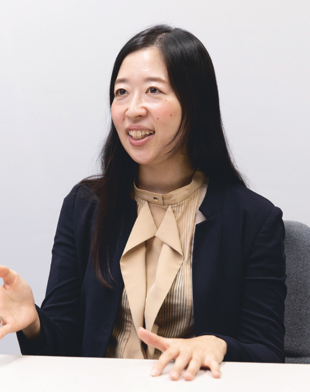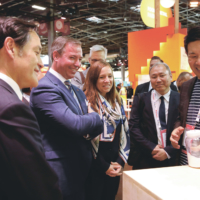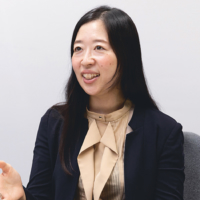Startups, whose key objectives revolve around innovation and market disruption, have the potential to drive economic growth and generate significant numbers of jobs. The Japanese government’s Startup Development Five-Year Plan, formulated at the end of 2022, aims to increase the amount invested in startups tenfold by fiscal 2027.
Previously, economy- and innovation-related ministries have been the primary government bodies responsible for supporting startups. However, this new plan marked a significant shift toward a whole-of-government approach to fostering startups. Now all ministries and agencies are actively engaging in startup support initiatives.

To gain insight into the background and prospects of this groundbreaking initiative, The Japan Times spoke with Sayaka Tomihara, director of the Startup Promotion Office in METI’s Innovation and Environment Bureau. Tomihara, who stands at the forefront of startup support, shared her perspectives on this transformative measure.
In the U.S., tech giants like Google, Amazon, Facebook (Meta), Apple and Microsoft — once startups themselves, and now collectively known as GAFAM — have grown to enormous size and continue to drive significant economic growth. Tomihara emphasized: “It’s crucial for Japan to foster companies that can significantly reshape our economic landscape, similar to what we’ve seen with tech like GAFAM. This is why we at METI, and the government as a whole, are committed to nurturing such innovative startups.”
Recognizing this potential, the government’s plan aims to foster innovative companies in both scale and impact. This comprehensive initiative is designed to catalyze Japan’s economic growth through a comprehensive approach that focuses on three key areas: building human resources and networks for creating startups, strengthening funding for startups and diversifying exit strategies, and promoting open innovation.
The number of startups in Japan has experienced remarkable growth, surging from 16,000 in 2021 to 25,000 today. This has been accompanied by a rising interest in entrepreneurship. Many new graduates now view startups as attractive career options, considering them on par with opportunities at large, established companies. This shift in perception extends beyond young professionals, as the number of workers over 40 joining startups has increased more than sevenfold since 2015.
Alongside the rapid proliferation of startups, university-launched ventures are also emerging at an unprecedented rate. This isn’t limited to universities in Tokyo; institutions in local areas are contributing equally to the trend, significantly broadening the startup ecosystem’s foundations.
Reflecting on this situation, Tomihara outlined the next phase of development: “Moving forward, our challenge will be to nurture startups with significant scale and prominence. We aim to foster large-scale startups that become household names and serve as aspirational models for many aspiring entrepreneurs. The challenges that Japan faces, such as an aging population and labor shortages, are poised to become significant global issues in the near future. Startups that emerge with ambitious visions to address these social challenges have the potential to not only solve these problems but also to fundamentally transform the economic structure itself.”
To achieve this, a robust and comprehensive support system is essential. Tomihara said its cornerstone lies in cultivating a global startup ecosystem. Foreign investors highly value Japan’s human capital and technological prowess, she said. “However, our challenge lies in effectively connecting these assets to the global ecosystem. To address this, we’re launching initiatives that immerse Japanese entrepreneurs in overseas programs, strengthening their global networks. We’re placing particular emphasis on these efforts.”
One initiative that has garnered significant attention is the J-StarX program, an evolution of the Kakehashi Project launched nine years ago. Tomihara said: ”The Kakehashi Project was initiated during former Prime Minister [Shinzo] Abe’s first visit to Silicon Valley as Japan’s leader. Its primary goal was to nurture talent that could bridge Japan and the United States. We began modestly, sending a small cohort of about 20 entrepreneurs. Now we’ve dramatically scaled up our efforts. The J-StarX program aims to send 1,000 entrepreneurs abroad by fiscal year 2027 — an enormous increase from our initial numbers. We’ve also expanded our program’s reach beyond Silicon Valley.
“Our goal is to forge deeper connections with diverse innovation hubs, each offering unique strengths. These include tech centers in Europe such as France and the United Kingdom, Asian hubs like Singapore and Indonesia, and additional U.S. hot spots like Boston and San Diego.”
The J-StarX program is already yielding tangible results, with Heralbony Inc. serving as a prime example. Based in Morioka, Iwate Prefecture, Heralbony is an impact startup that has developed an intellectual property business centered around the works of artists with intellectual disabilities. Its participation in the program proved to be a pivotal moment in its international expansion.
In May 2024, Heralbony achieved a milestone by being selected as a finalist for the prestigious LVMH Innovation Award. The global competition recognizing groundbreaking startups is organized by the luxury giant LVMH Moet Hennessy Louis Vuitton, a French multinational holding company representing 75 leading luxury brands. Heralbony’s accomplishment underscores the program’s effectiveness in propelling Japanese startups onto the world stage.
One of Heralbony’s operational bases is Station F, a renowned startup hub in Paris. Originally a train station, the building has been transformed into one of Europe’s largest startup centers, housing numerous innovative ventures, many backed by global giants such as Google and LVMH. Station F has established itself as a vibrant nexus of global innovation, embodying the spirit of entrepreneurship and technological advancement.
The J-StarX program also plays a crucial role in positioning the entire Japanese startup ecosystem on a global scale. Of particular importance are its focus on facilitating Japanese entrepreneurs’ entry into the “inner circle” of global business, establishing an international reputation for Japan as a source of entrepreneurs with innovative ideas and seeking to build trust between the startup ecosystems in Japan and elsewhere. The ultimate goal is to foster strong, mutually beneficial relationships between Japan’s startup ecosystem and those of other nations.
The government has established a startup support center, the Japan Innovation Campus, in Silicon Valley, widely recognized as the world’s most developed startup ecosystem. This center aims to serve as a crucial node connecting Japan’s startup ecosystem with those in the U.S. and other countries. It aims to facilitate seamless connections and knowledge transfer across these innovative hubs, further catalyzing the growth of Japanese startups on the global stage.

Tomihara elucidated the facility’s role: “The Japan Innovation Campus is an essential hub for Japanese startups with global ambitions. It’s a convergence point where these innovative companies can unite, sharing knowledge and resources among themselves and with the system. It’s a place where they can collaborate on marketing and branding strategies that showcase Japan’s technological prowess and innovative spirit on the world stage.”
Another initiative aims to provide Japanese startups with professional and practical assistance when entering international markets. At its core is the Global Acceleration Hub program. To date, Global Acceleration Hubs have been established in 30 countries worldwide. They leverage the extensive international network of the Japan External Trade Organization (JETRO).
Other focuses are attracting global investors and entrepreneurs, and nurturing deep tech. The Cabinet Secretariat leads the Global Startup Campus Initiative, a flagship base to be constructed in the heart of Tokyo to attract leading researchers from around the world and generate global deep-tech startups. METI also offers “startup visas,” inviting foreign entrepreneurs to enter and stay in Japan for up to two years even before founding their business. The public-private funds Japan Investment Corp. and SME Support Japan invest in global venture capital funds that contribute to the development of the startup ecosystem in Japan, investing in Japanese startups and supporting their global expansion.
Reflecting on the future, Tomihara observed: “The startup landscape in Japan is undergoing a dramatic transformation, driven by a convergence of factors including government initiatives, shifting workforce mindsets and the evolving interest of large corporations. Global investors are accelerating business in Japan. Our hope is that this momentum will be sustained, generating more success stories that will elevate Japan’s startup ecosystem to new heights.”
The transition to the new phase hinges on continued government support, active involvement of the private sector and, most importantly, the perseverance and ingenuity of the entrepreneurs themselves. The stage is now set for Japan to emerge as a significant player in the international startup arena. Global expectations are mounting for the potential impact of Japanese innovations on future technological advancement.
METI invites entrepreneurs and investors to join it at the first Global Startup Expo at Osaka’s Expo 2025 on Sept. 17 and 18.






